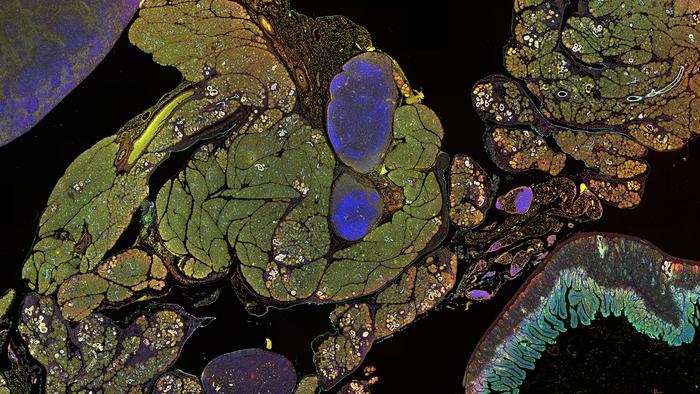A recent breakthrough in the fight against pancreatic cancer has emerged from the Cold Spring Harbor Laboratory. Researchers led by Professor David Tuveson, alongside Research Investigator Claudia Tonelli, have unveiled critical insights regarding the inhibition of specific proteins involved in tumor formation in pancreatic cells. This innovative study, published in the esteemed journal Cancer Research, highlights the potential of targeting FGFR2 and EGFR proteins as a strategy to intercept pancreatic cancer development. Given the notorious lethality and rapid progression of this disease, their findings offer a promising avenue for early intervention.
Pancreatic cancer, often described as a silent killer, has gained significant attention in medical research due to its aggressive nature and the limited options available for therapeutic intervention upon diagnosis. By 2030, it is projected to become the second-leading cause of cancer-related deaths. A critical challenge in combating this disease lies in the fact that by the time it is typically diagnosed, the cancer has often reached an advanced stage, thereby complicating treatment efforts. This reality is underscored by Professor Tuveson’s analogy comparing the human condition of monitoring skin moles for malignant transformations to the invisible precursors of cancer lurking in the pancreas.
The breakthrough study spearheaded by Tuveson and Tonelli revolves around the genetic intricacies of pancreatic cancer cells. A staggering 95% of patients with pancreatic cancer carry mutations in the KRAS gene, a well-established oncogene. These mutations drive the progression of the disease. The novel findings reveal that FGFR2, another gene previously implicated in other cancer types, significantly amplifies mutant KRAS signaling. The researchers discovered that when FGFR2 is activated alongside mutant KRAS, the early manifestations of pancreatic cancer become markedly more aggressive and difficult to treat.
Employing a variety of experimental models, including mouse models and organoids designed to mimic human pancreatic tissue, the researchers set out to elucidate the mechanisms underlying cancer progression. Their objective transcended mere observation; they aimed to develop a strategy for intercepting the progression of the disease entirely. Given that several FGFR2 inhibitors are already in clinical use for other cancers, this study represents a vital step toward innovative treatment protocols for pancreatic cancer.
In a series of targeted experiments, Tonelli and her colleagues disrupted FGFR2 signaling at crucial junctions, yielding significant results. They noted a marked decrease in tumor formation rates when FGFR2 was inhibited during early cellular processes. Additionally, when they combined FGFR2 inhibition with the blockade of EGFR—a receptor often overactive in pancreatic malignancies—the results were even more promising. The combination therapy not only slowed down tumorigenesis but also reduced the incidence of the early precursors to pancreatic cancer.
The implications of this research are expansive, particularly for patients deemed at high risk for developing pancreatic cancer, such as those with a familial history of the disease. By establishing a foundation for the use of FGFR2 and EGFR inhibitors as a preventive measure, the research team has paved the way for potential clinical trials targeting pancreatic cancer interception. These findings could usher in a new era of proactive cancer prevention strategies, enabling earlier interventions before the transition to malignancy occurs.
Additionally, this research opens the door to a plethora of new questions regarding the signaling pathways involved in pancreatic cancer. Understanding the interactions between FGFR2, EGFR, and KRAS is crucial for developing tailored therapeutic approaches, as these pathways may be adept at orchestrating complex cellular behaviors leading to cancer. Future studies will likely explore the broader effects of these inhibitors on pancreatic tissue, the effectiveness of various inhibitors, and whether the timing of intervention significantly influences outcomes.
As the study gains traction within the scientific community, it highlights the growing importance of multidisciplinary research in understanding and combating cancer. Collaborations across different fields—ranging from molecular biology to clinical oncology—will be essential in translating these findings from the laboratory bench to the patient’s bedside. Moreover, the potential for repurposing existing drugs in novel ways reflects a significant advancement in how the medical community can address formidable challenges in cancer treatment.
In conclusion, the dynamic interplay of genetics in pancreatic cancer reveals both the complexity and potential for targeted therapeutic strategies. As researchers like Tuveson and Tonelli continue to unravel these intricacies, we may be on the cusp of developing more effective and timely interventions against one of the most challenging cancers we face today. Their work not only highlights the advancements in medical research but also inspires hope for improved patient outcomes in the face of pancreatic cancer’s adversity.
Subject of Research: Inhibition of FGFR2 and EGFR proteins in pancreatic cancer
Article Title: Targeting FGFR2 and EGFR Proteins: A New Approach to Prevent Pancreatic Cancer Formation
News Publication Date: 2-Apr-2025
Web References: Cold Spring Harbor Laboratory, Cancer Research
References: N/A
Image Credits: Tuveson lab/CSHL
Keywords: Pancreatic cancer, FGFR2 inhibitors, EGFR inhibitors, cancer genetics, tumor formation




